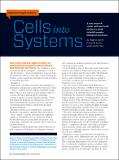Cells into Systems
Author(s)
Nerem, Robert M.; Jimmy Hsia, K.; Kamm, Roger Dale
Downloadme-2010-nov2.pdf (508.1Kb)
PUBLISHER_POLICY
Publisher Policy
Article is made available in accordance with the publisher's policy and may be subject to US copyright law. Please refer to the publisher's site for terms of use.
Terms of use
Metadata
Show full item recordAbstract
The National Science Foundation has awarded a Science and Technology Center grant to a group of researchers to explore ways in which complex biological machines can be created. The new center is named Emergent Behaviors of Integrated Cellular Systems, or EBICS. It consists of scientists and engineers from the Massachusetts Institute of Technology, the Georgia Institute of Technology, the University of Illinois at Urbana-Champaign, and three minority-serving institutions, the City College of New York, Morehouse College in Atlanta, and the University of California at Merced. EBICS's mission is to create a new scientific discipline for building living, multicellular machines that solve real-world problems in health, security, and the environment. Emergent systems, on the other hand, rely on the methods used by nature, as in the case of biological development of an organism from embryo to adult.
Date issued
2010-11Department
Massachusetts Institute of Technology. Department of Mechanical EngineeringJournal
Mechanical Engineering
Publisher
American Society of Mechanical Engineers
Citation
Kamm, Roger D., Robert M. Nerem, and K. Jimmy Hsia. “Cells into Systems.” Mechanical Engineering 132, no. 11 (November 1, 2010): 30.
Version: Final published version
ISSN
0025-6501